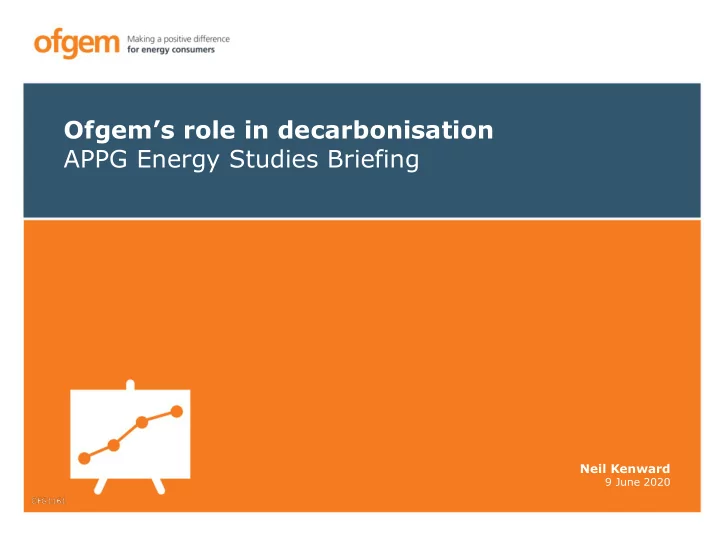

Ofgem’s role in decarbonisation APPG Energy Studies Briefing Neil Kenward 9 June 2020
The UK has made good progress to date, especially in decarbonising power. Net zero represents a step change in ambition and challenge The UK has reduced its emissions faster than any other major economy and has made significant progress in decarbonising power. With the net zero target, the UK must now accelerate the decarbonisation of other sectors, including heat and transport. UK carbon emissions, key sectors To reach net zero, the UK needs: 1,000 UK emissions reduction since >40% POWER 1990 – fastest in G7 Quadrupling total low carbon generating capacity, Annual emissions (MtCO2e) 800 adding 6-10 GW/year, mostly wind and solar. Double investment to £20 billion pa by 2050. 600 BUILDINGS Increase low carbon heat from less than 5% of homes to c.90%, c.1 million pa, with annual 400 investment rising to £20 billion by 2050. CB4 CB5 TRANSPORT 200 From 230,000 EVs now to 46 million by 2050 NEGATIVE EMISSIONS 0 Needed at scale, from BECCs (bio-CCS) DACCS 1990 1995 2000 2005 2010 2015 2020 2025 2030 2035 2040 2045 2050 (direct air capture) and land use change -200 Sources: Ofgem, based on BEIS and CCC historic data and projections 2
Decarbonisation presents a range of challenges. Ofgem has a key role to play enabling decarbonisation at least cost Reaching net zero will require Government sets the direction a transformation of the UK’s of policy, including decisions on energy sector, which comes taxation and public spending. with numerous challenges, But Ofgem has a key role to including: play and has made decarbonisation a top priority: sectoral convergence with the • electrification of transport and at In July 2019, Ofgem published a least some heat • Strategic Narrative , identifying massive new investments required • “ decarbonising at lowest cost ” as a requirement for major market • one of three core strategic interventions (climate change is a objectives massive market failure) rapid change, and uncertainty about • Our Decarbonisation Action • which technologies are optimal Plan , published February 2020, increased participation by non- • set out nine key actions Ofgem is energy actors (heat as service, local taking to enable the transition to flexibility markets) net zero
Examples of Ofgem’s role ENERGY INFRASTRUCTURE CONSUMERS Smart and flexible markets Network regulation Households can save money by using Ofgem sets price controls for network • • electricity when it is cheaper and more companies, and will ensure their plentiful. For example, smart charging investment plans support can save drivers money by charging their decarbonisation electric vehicle when electricity prices are cheapest. Supporting offshore wind And we are working with the Ofgem is supporting plans to develop • • Government and the sector to roll out an offshore grid, which would connect smart meters. offshore wind farms: minimising costs, increasing flexibility, and reducing the Retail markets number of new coastal connections Ofgem supports energy firms to create required • low carbon products and services for consumers for example by expanding our Managing the system regulatory ‘sandbox’ service, and The energy system needs to become • conducting trials on consumer uptake of much more flexible to efficiently enable Time-of-Use tariffs increased renewable generation. We are increasing flexibility in energy Scheme delivery markets, and undertaking a review of Ofgem also delivers government how the system is managed by the • decarbonisation programmes such as the System Operator (currently National Renewable Heat Incentive Grid)
There will be costs, but also opportunities In the short term, making the transition to net zero is likely to incur • additional costs as new investment is required and new technologies are rolled out. Ofgem will work to ensure that the costs of decarbonisation are as low as • possible – much of the cost can be gradually recouped from energy bills over decades. Net zero is massive challenge but also massive opportunity – getting it • right will result in a cleaner, more efficient and user-friendly energy system and create new, sustainable jobs and industries 5
ANNEX SLIDES 6
Annex A: Decarbonisation Action Plan Ofgem’s Decarbonisation Action Plan set out nine priority actions: Preparing the networks to deliver 1. Designing cost effective networks for net zero 2. Long-term planning and innovation 3. More effective coordination to deliver low cost offshore networks 4. Preparing for low-carbon heat Ensuring the electricity system is ready 5. Preparing system operators for a net zero future 6. Supporting flexibility 7. Enabling electric vehicles at low cost Opening up retail innovation and driving behaviour change 8. Opening up retail innovation Reforming the organisation – how we will change 9. Adapting the organisation 7
Annex B: Ofgem’s statutory duties on decarbonisation 1989 Electricity Act, including 2008 and 2010 amendments: The principal objective of …[GEMA] …is to protect the interests of existing and future consumers in relation to electricity conveyed by distribution systems or transmission systems. Those interests of existing and future consumers are their interests taken as a whole, including: their interests in the reduction of electricity-supply emissions of targeted greenhouse gases; ... In performing the duties […] [GEMA] shall have regard to: … (c) the need to contribute to the achievement of sustainable development. Additional guidance issued by the Secretary of State in 2010: The Government considers that the Authority has an important role, consistent with its principal objective, general duties and functions, in bringing about an energy system that encourages substantial carbon emission reductions in a timescale consistent with the above [80% reduction] targets. 8
Recommend
More recommend